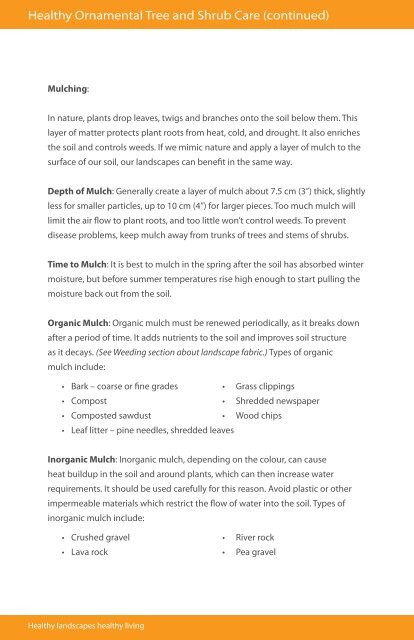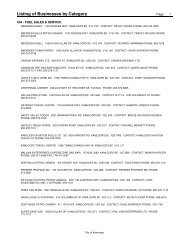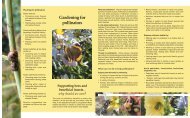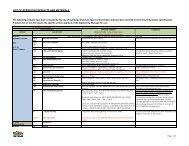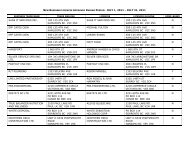PLANT HEALTH CARE - City of Kamloops
PLANT HEALTH CARE - City of Kamloops
PLANT HEALTH CARE - City of Kamloops
You also want an ePaper? Increase the reach of your titles
YUMPU automatically turns print PDFs into web optimized ePapers that Google loves.
Healthy Ornamental Tree and Shrub Care (continued)<br />
Mulching:<br />
In nature, plants drop leaves, twigs and branches onto the soil below them. This<br />
layer <strong>of</strong> matter protects plant roots from heat, cold, and drought. It also enriches<br />
the soil and controls weeds. If we mimic nature and apply a layer <strong>of</strong> mulch to the<br />
surface <strong>of</strong> our soil, our landscapes can benefit in the same way.<br />
Depth <strong>of</strong> Mulch: Generally create a layer <strong>of</strong> mulch about 7.5 cm (3”) thick, slightly<br />
less for smaller particles, up to 10 cm (4”) for larger pieces. Too much mulch will<br />
limit the air flow to plant roots, and too little won’t control weeds. To prevent<br />
disease problems, keep mulch away from trunks <strong>of</strong> trees and stems <strong>of</strong> shrubs.<br />
Time to Mulch: It is best to mulch in the spring after the soil has absorbed winter<br />
moisture, but before summer temperatures rise high enough to start pulling the<br />
moisture back out from the soil.<br />
Organic Mulch: Organic mulch must be renewed periodically, as it breaks down<br />
after a period <strong>of</strong> time. It adds nutrients to the soil and improves soil structure<br />
as it decays. (See Weeding section about landscape fabric.) Types <strong>of</strong> organic<br />
mulch include:<br />
• Bark – coarse or fine grades • Grass clippings<br />
• Compost • Shredded newspaper<br />
• Composted sawdust • Wood chips<br />
• Leaf litter – pine needles, shredded leaves<br />
Inorganic Mulch: Inorganic mulch, depending on the colour, can cause<br />
heat buildup in the soil and around plants, which can then increase water<br />
requirements. It should be used carefully for this reason. Avoid plastic or other<br />
impermeable materials which restrict the flow <strong>of</strong> water into the soil. Types <strong>of</strong><br />
inorganic mulch include:<br />
• Crushed gravel • River rock<br />
• Lava rock • Pea gravel<br />
Healthy landscapes healthy living


